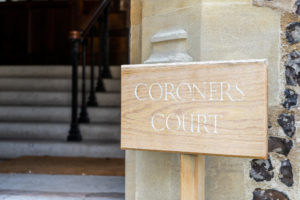Excellent experience start to finish – always very responsive to any queries and the turnaround on the property I was buying was very quick, even in the busy time leading up to stamp duty deadline. Jenny was always very helpful and went above and beyond to close on a short timescale.
Tanya Birkett – Paralegal in our Personal Injury team
Talk’s about the coroner’s court: Fact Sheet.
What is the Coroner’s Court?
- A Coroner’s Court is used to conduct investigations and inquests into the manner or cause of a death, and to investigate or confirm the identity of the person who has died.
- They are presided over by a Coroner, who is an independent judicial officer.
- Coroners are appointed by local authorities and must be qualified lawyers.
- The purpose of the Coroner’s Court is not to explore questions of responsibility for the death; the duty is limited to establishing who has died and how, when and where they came by their death.
- The Coroner has a duty to investigate as soon as possible.
When do you go to the Coroner’s Court?
- A death may be investigated by a Coroner if the cause of death is deemed unnatural, violent or unknown.
- They will also investigate where the death occurred in a prison or while under medical care and the doctor is unwilling to make a determination upon death.
- The Coroner’s investigation may simply be a review of the circumstances and ordering a post-mortem examination, or they may order an inquest.
- An inquest will be held where the death is violent, sudden, of unknown cause or in occurred while in custody.
- At some inquests there will be a jury. A jury is summoned where the death is not natural, was caused by a member of the police force, was caused by an accident which must be reported to a governmental body, occurred in custody, or where the circumstances surrounding the death are notable.

Process at the Coroner’s Court
- Coroners usually rely upon the police and other regulatory agencies to investigate the circumstances of the death and submit the evidence to the Court before listing a date for the inquest.
- The investigations in the Coroners Court are open to the public and the press, unless the coroner considers it in the national interest to keep them closed – the inquest will be publicised in advance.
- There are several people who can be named as “interested parties” in an investigation at the Coroners Court, and these include:
- Family members of the deceased
- A PR of the deceased
- Medical examiners involved in relation to the death of the deceased
- A person who by any act or omission may have caused or contributed to the death of the deceased
- A person appointed by or representing an enforcing authority
- An interested party is entitled to disclosure of documents from the coroner, to be informed of the date, time and place of the inquest, and to put questions to the witnesses at the inquest.
- Applications to be registered as an interested party must be sent to the coroner.
- It is the responsibility of the Coroner to decide on the scope of the inquest and which witnesses will be called, and then to lead the questioning of the witnesses.
- After hearing all the evidence, the Coroner or jury (if there is one) must make a determination on the following:
- Who the deceased was
- When the deceased came by their death
- Where the deceased came by their death
- How the deceased came by their death
- These findings are recorded as part of the process for registering the death.
For more information about Tanya.
Found this article useful? You might be interested in some of our others:


